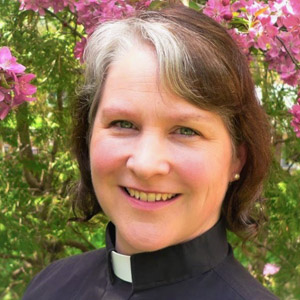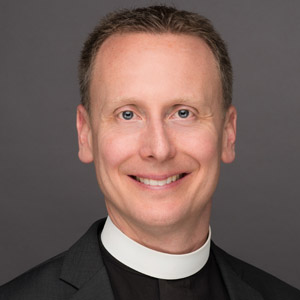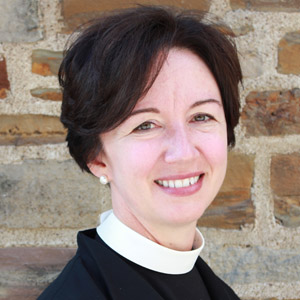By Martha Holmen and Stuart Mann
After many hours of prayerful consideration, the Rev. Riscylla Walsh Shaw, the Rev. Canon Kevin Robertson and the Rev. Canon Jenny Andison were elected suffragan bishops in the Diocese of Toronto at St. Paul, Bloor Street on Sept. 17.
The day began at 9:30 a.m. with a Eucharist celebrated by Archbishop Colin Johnson. After breaking bread together, Synod members began the first of three elections. At the start of voting, there were 297 clergy and 321 laity registered to vote.

Bishop-elect Walsh Shaw was elected on the seventh ballot of the first election. She is 44 and the incumbent of Christ Church, Bolton. She earned a Master of Divinity from Wycliffe College in 1999 and was ordained deacon in 2001 and priest the same year. Bishop-elect Walsh Shaw and her husband Jana have two children.
“This is a real gift from the diocese and from the Spirit, and I feel very blessed and humbled,” she said afterwards. “I really look forward to being with the people and being a leader amongst them.”
Bishop-elect Walsh Shaw is Metis and serves as an Ambassador of Reconciliation in the diocese. “It’s a real honour and blessing to be part of the leadership, bringing that culture and point of view with me. At the Truth and Reconciliation Commission hearings, I learned a lot and made a lot of connections with the people across the land, so this is a really wonderful opportunity to find different ways to address some of the issues of reconciliation that we have in our diocese, and also to raise the culture of Metis.”
She added: “I think this is a time of great hope and I’m really excited. It’s an historic time for the diocese and the culture is changing – it’s a new day for the church, I think.”

Bishop-elect Robertson was elected on the fourth ballot of the second election. He is 45 and the incumbent of Christ Church, Deer Park in Toronto. After earning his Master of Divinity from Trinity College in 1997, he was ordained deacon the same year and priest in 1998. He lives in Toronto with his partner Mohan and their family.
“I’m very overwhelmed,” he said on the chancel steps after the elections. “I didn’t really expect to be standing here on the steps, but I’m deeply, deeply honoured. I realize this is an historic day in the life of our church. It’s no secret that I’m the first openly gay, partnered bishop-elect in the diocese and perhaps in the Canadian church as well, and I know that for some people that’s a real challenge and for others it’s the fulfillment of what they’ve been hoping and praying for for a very long time. The peace and unity of the church is really important to me and I will work to continue that peace and unity as a bishop.”
Bishop-elect Robertson said his election is a turning point for the church in accepting and supporting LGBTQ people. “I think General Synod (in July) was a turning point for the national church and my election today is a turning point for our diocese, and I’m honoured to be a part of that. I’m really encouraged by the developments over the past couple of months – both General Synod and today bode really well for the full inclusion of LGBTQ people in the life of our church.”
He said he will be a bishop for the whole church. “I think LGBTQ clergy and lay people might naturally gravitate towards me looking for some leadership around the issue of full inclusion, but I absolutely see myself as a bishop for the whole church, including people who have a very different view of things than I do. I’m their bishop, too.”
He said he is passionate about renewing ministry at the parish level. “I hope I can help to renew the life of the church at the local level, and as a result strengthen and enhance the whole church. One of the things I want to do is really engage with clergy and lay leaders, including churchwardens, to reinvigorate things.”

Bishop-elect Andison was elected on the third ballot of the third election. She is 44 and the incumbent of St. Clement, Eglinton in Toronto. After earning a Master of Divinity from Wycliffe College in 1997, she was ordained deacon the same year and priest in 1999. She was previously the Archbishop’s Officer for Mission. Bishop-elect Andison and her husband Tim have three daughters. They hugged her after the election and shed tears of joy.
“It’s overwhelming,” said Bishop-elect Andison. “I just asked the people of the diocese to pray for my soul, and that I would be a bishop who is faithful to God and pastoral to everyone. My passion is seeing churches renewed and grow and spread the love of Christ to people who have never heard it, so it will be a huge and exciting privilege to work with the laity and clergy of the diocese to help more people know the love of Jesus.”
This was the first time running in an episcopal election for all three bishops-elect. The other nominees were the Rev. Canon Susan Bell, the Rev. Canon Dawn Davis, the Rev. Canon Stephen Fields, the Rev. Dr. Byron Gilmore, the Rev. Canon David Harrison, the Rev. Canon Mark Kinghan, the Rev. Warren Leibovitch, the Rev. Canon Heather McCance and the Rev. Canon Janet Read-Hockin.
Archbishop Johnson said the elections will bring about “significant change” in the diocese because all three bishops-elect are in their 40s. “It will be a very diverse College of Bishops in this diocese – as diverse as anybody can imagine.”
He added: “They are all deeply committed to renewal of the church and its extension in both traditional and in new ways, and I’m really excited by that. I also think it will be a team that can work very well together.”
He said Bishop-elect Robertson’s election will likely bring mixed reactions from across Canada and around the Anglican Communion. “Kevin is certainly not the first gay man to become a bishop in the Communion but his election will probably bring a negative reaction in some places and a positive reaction in others. We’re at an early stage in this experience; I think many parts of the world do not understand it, so it will be a challenge for them, but it will be an opportunity for us to explain how and why we have made this choice today.”
Before the first election began, the Rev. Dr. Catherine Sider Hamilton issued an official protest against the inclusion of “one candidate whose lifestyle is, to the best of my knowledge, irregular according to the teaching of the church regarding chastity and marriage. It is a teaching that still stands formally, and I believe that the inclusion of this candidate by the nominations committee is premature.” Archbishop Johnson replied that all the nominees were clergy under license in the diocese and in good standing. Synod proceeded with all the nominees on the ballot.
Archbishop Johnson said the election results will now go to the Ontario House of Bishops for their concurrence, a standard procedure for all episcopal elections. They need to make their decision within a week. “That’s not a foregone conclusion but I expect that will happen,” he said.
Archbishop Johnson described the electoral Synod as gracious and attentive. “We had a very large number of people here – more than 600 took part in the election – and I think that says that it’s truly representative of the diocese. One of the things it’s representative of is that in spite of differences, we are united together because we have been baptized as members of Jesus Christ and we share the mission to proclaim the good news. Those are the things that are far more important than the issues that divide us.”
The three new suffragan bishops will be consecrated at St. Paul, Bloor Street on Jan. 7, 2017. Each new bishop will provide oversight of one of the diocese’s four episcopal areas: York-Scarborough, York-Credit Valley, Trent-Durham and York-Simcoe. (Bishop Peter Fenty is currently the area bishop of York-Simcoe.) Archbishop Johnson will decide where the new bishops will serve.
The elections on Sept. 17 became necessary after the translation of Bishop Linda Nicholls to the Diocese of Huron and the announced retirements of Bishop Philip Poole and Bishop Patrick Yu.
This was the second time the diocese had elected three suffragan bishops on the same day. Bishops Arthur Brown, Desmond Hunt and Basil Tonks were elected on Nov. 28, 1980, and consecrated together on Jan. 27, 1981.